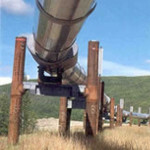Oil and Gas Unitization: Specific Considerations for Cross-Border Unitization
An article in King & Spalding’s Energy Newsletter discusses some of the issues that are typically addressed in a unitization and unit operating agreement (UUOA) that may require particular attention in the context of a cross-border unitization. Authors are Philip Weems and Nina Howell.
“An oil or gas reservoir may straddle adjacent contract areas,” the authors explain. “Unitization is the process whereby the straddling reservoir is jointly developed by the interest owners in the adjacent contract groups. Joint development of a straddling reservoir is usually more economical and efficient than separate developments by the adjacent contract groups. A key principle of unitization is that the straddling reservoir is physically developed as though the boundary between the contract areas does not exist.”
They advise that in a cross-border unitization, additional scrutiny may be necessary due to the complexities and limitations that arise due the reservoir being subject to the jurisdiction of two governments.
 Twenty-four states are suing to block the Obama administration from implementing its new clean power regulations — the cornerstone of a promise that the United States will reduce greenhouse gas emissions to limit global warming, but some Texas energy companies are not as unanimous in their opposition. That’s because Texas’ energy sector is transforming rapidly,
Twenty-four states are suing to block the Obama administration from implementing its new clean power regulations — the cornerstone of a promise that the United States will reduce greenhouse gas emissions to limit global warming, but some Texas energy companies are not as unanimous in their opposition. That’s because Texas’ energy sector is transforming rapidly,  Baker Botts
Baker Botts On March 17, the U.S. Department of Transportation’s Pipeline and Hazardous Materials Safety Administration (PHMSA) issued a major proposal to revise the safety standards for onshore natural gas pipelines, reports
On March 17, the U.S. Department of Transportation’s Pipeline and Hazardous Materials Safety Administration (PHMSA) issued a major proposal to revise the safety standards for onshore natural gas pipelines, reports  The rise of local bans on hydraulic fracturing, or “fracking,” by local governments has sparked a recent backlash in carbon-producing states, writes
The rise of local bans on hydraulic fracturing, or “fracking,” by local governments has sparked a recent backlash in carbon-producing states, writes  On January 22, 2016, Secretary of the Interior Sally Jewell unveiled a
On January 22, 2016, Secretary of the Interior Sally Jewell unveiled a  Platts has posted an
Platts has posted an